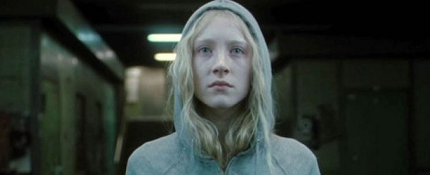Not long ago, I was listening to Row Three's Cinecast, and the gents were discussing Todd Solondz's latest film Life During Wartime, specifically in how it compared to his previous films, Happiness in particular. Generally, praise was given to the film, though it was at times tempered with quotes along the lines of "that's just Solondz doing what he does." A bit later on the same conversation, Wes Anderson came up, as did Wong Kar-wai, in the same context. Kurt mentioned how much it bothered him that certain directors are shit upon for, more or less, making the same movie over and over again, that their quality should stand above their relative newness. The Darjeeling Limited was a key example.
I couldn't disagree more.
An artist that makes a great piece of art, and then does little more than duplicate said piece ad nauseum ceases to be an artist and instead transforms into a wannabe of their own work. To cease to take risks is not only cowardly but boring. I was one of those people that blasted Anderson for Darjeeling; in my review, I stated that "Anderson needs to branch out or change some things up lest he be deemed irrelevant in the near future." Thankfully, he took a giant leap towards doing just that with Fantastic Mr. Fox, a departure in form if not style - but it's a big start, and more importantly, it felt like a risk.
Where the conversation really gets interesting is when its applied to music. We seem to want to have it both ways with artists. On the one hand, we (me) celebrate The Beatles for starting as a straight-up pop band and, within an infinitesimally small period of time for a musical act, became something altogether different, playing with sitars, metal, and cascading, intersecting melodies and arrangements. For their growth, they are universally acclaimed, where had they stayed a boy band into their 30s, they might well be forgotten.
On the other hand, witness rock legends such as the Rolling Stones or Aerosmith or even U2. The former two have, for the most part, made no significant changes to the style of music they've played since...ever, and were they to at this point, they would be widely ridiculed (assuming they are even relevant at this time, which they really aren't). The latter has taken more of a Beatle-ish route, occasionally delving into other genres while maintaining generally the same level of popularity. But back to film.
Take a look around at any of the celebrated directors of the past few decades, and more often than not, they will be risk-takers, more than willing to step outside of their comfort zone (if they were even ever pushed into one): Quentin Tarantino, Martin Scorcese, Steven Spielberg, David Fincher...
...and the subject of this month's LAMBs in the Director Chair series, Steven Soderbergh.
If there's anything Soderbergh has proven over the last 20 years, it's his versatility and unwillingness to be typecast. Covering everything from celluloid to digital video, independents to big budget extravaganzas, comedies to dramas to documentaries and everything in between, Soderbergh is the biggest director currently working that's also nearly impossible to pin down. You might not love or even be interested in everything that he's done (I consider myself a fan and yet have not seen 12 of his 20 films), but you can rest assured with the fact that whatever is next on his radar is likely different from what you've previously seen from him.
So where do you stand: Stay the Course or Boldly Go?
skip to main |
skip to sidebar




(click refresh to see more singles or click image for full posts)
Featured Posts
Subscribe to:
Post Comments (Atom)
i like you...to like me
Things to click on (movies)
- A Life in Equinox
- Andrew at the Cinema
- Anomalous Material
- Bitchin' Film Reviews
- Careful With That Blog, Eugene
- Cinema Sights
- Cinematic Paradox
- Cut the Crap Movie Reviews
- Darkmatters
- Eternal Sunshine of the Logical Mind
- Fandango Groovers Movie Blog
- Film Forager
- Films From the Supermassive Black Hole
- Fire and Music
- French Toast Sunday
- Getafilm
- History on Film
- Insight Into Entertainment
- Invasion of the B Movies
- Kano's Lay-Z-Boy Theater
- Lazy Eye Theatre
- Little Worlds
- Magic Lantern Film Blog
- Man, I Love Films
- Movie Moxie
- Movie Reviews by Tom Clift
- Nerdvampire's Film Blog
- Nevermind Popular Film
- Only the Cinema
- Rachel's Reel Reviews
- Random Ramblings of a Demented Doorknob
- Reel Whore
- Ross V Ross
- Screaming Blue Reviews
- Screen Insight
- The Armchair Critic
- The Athletic Nerd
- The Audient
- The Awards Circuit
- The Cooler
- The Film Cynics
- The Great White Dope's Mecha-Blog-Zilla
- The List
- The Ramblings of a Minnesota Geek
- The Stop Button
- TotalFilm
- Victim of the Time
Things to click on (other)
Top Recent Dwellers
Sequels that won't happen
(click refresh to see more singles or click image for full posts)
Fletch Film Rating System
All reviews by rating
For more on the system, click here
All reviews by alphabet
 | "You're the best ... around" |
 | "It's in the hole!" |
 | "Darn tootin" |
 | "You seem a decent..." |
 | "Whatever" |
 | "I want you to punch me..." |
 | "I'm mad as hell..." |
For more on the system, click here
All reviews by alphabet
Top Twenty Tags (post labels)
The Archives
Followers
Subscribe
Follow me on Twitter
We can @ each other all day long
Like Blog Cabins on Facebook
Small stuff, fun stuff, other stuff
The LAMB
That one movie blog directory I founded
Man, I Love Films
The spanky new site
Copyright 2006-2011. Blog Cabins: Movie Commentary and Reviews Made Fun - WPBoxedTech Theme Design by Technology Tricks for Health Coupons.
Bloggerized by Free Blogger Template - Sponsored by Graphic ZONe and Technology Info
Bloggerized by Free Blogger Template - Sponsored by Graphic ZONe and Technology Info



















9 people have chosen wisely: on "Directorial Diversion: Stay the Course or Boldy Go?"
While I agree that it's great for a director to be versatile and take risks against his or her own "comfort zone", I don't think there's anything wrong with creating a signature style and maintaining it across several films.
Anderson is one of my favorite filmmakers, and I really enjoyed The Darjeeling Limited. His "Wes Anderson-ness" is why I see his movies; I expect that attention to detail, retro music, and kooky characters. The same goes for directors like Tim Burton or Terry Gilliam, whose off-kilter view of the world is easily visible in all of the their films, regardless of the stories they tell.
Basically, I don't see what's wrong with having both kinds of directors, as long as they're still making good movies!
It is not so much (as you put it) "To cease to take risks is not only cowardly but boring" it is a function of taking core themes and directions and keep hammering away at them from a different perspective. (Note that in the Darjeeling, the 'wacky father figure (James Caan (Bottle Rocket), Bill Murray (Rushmore, Life Aquatic), Gene Hackman (Tenenbaums)) is actually not physically present (only the so-called 'baggage'). Note the displaced location and 'road trip' nature that is not really an anderson staple (despite perhaps the on the lam sequence in BR).
Anyway, I don't think coming back to the same themes and type of movie is risk avoidance (Although Kevin Smith seems to be doing this somwhat with Zack & Miri make a Porno, but i digress...) as more of a exploration of your own art. wkw's Blueberry Nights is probably a prime example of this (and an awesomely good film, unfairly crapped on)
But all that being said, it really does seem that Fantastic Mr. Fox was a super-savvy move by Anderson in convincing a lot of folks to come back to the fold after Darjeeling, and good on him.
Thanks for the shout out to the show! Glad someone is listening! ha.
Cheers,
KuRt.
As with most discussions like this, it's really not black or white - there are degrees to which each of the directors mentioned either fall prey to what I called risk avoidance or embrace risk.
I was thinking about it a bit more, and it seems also that there's a very strong (and rightly so) correlation between that so-called comfort zone and whether or not the director is responsible for their own material. Off the top of my head, I'm fairly certain that Anderson has either written or co-written all of his films, and Fox (not coincidentally) is the first adapted from another source, thereby possibly infusing it with elements beyond his "wheelhouse."
Meanwhile, the directors I cited as "risky" are ones that pretty much never write their own material; Spielberg, Scorcese, Fincher, Soderbergh - they all work with another's screenplay and are less literal storytellers than visual ones, contrasted with the self-penned works of folks like Anderson and Woody Allen (I've actually not seen a single WKW flick).
Interesting, then, that you mentioned Tim Burton, Alex, as he seems to me to be a strange melding of the two (if he's classify-able at all): he doesn't write his own works, yet he seemingly crosses genres and themes (okay, not really - many, if not all, deal with Daddy issues). Then again, I'm fairly sick of Burton; where I once thought of him as a visionary - and he still might be literally just that - I now see him as a hack who only takes the work of others and colors them using his own crayons, usually for the worse. Do you even need to see Alice in Wonderland to know what he's done to it? I'm not far from placing him below the Bays and Emmerichs of the world, despite the great flicks he made early in his career.
So, yes and no to all of what I said and what you two said. ;) I suppose that, with Anderson, it really felt as though he was more or less remaking the same film time and again, diminishing his voice with each outing. But it's unrealistic to expect an author to tell so many different tales; they have only but their own experiences to work from.
Kurt - you're welcome! It's a good show, full of knowledge and strong opinions. I just wonder where you two get the time to see as many films as you seemingly do, not to mention the two hours+ to talk about them. ;)
Thanks, Fletch. I'll think about the above...you may be onto something with the screenwriting (again see Kevin Smith, Richard Kelly, etc.)
But on the last comment:
Stack in two kids, a wife, a full time job and somewhere in there, sleep or something like it! Now that I think about it, I'm not exactly sure where the time comes from.
I'm a little late with this but hadn't seen Fox until recently. I'm pretty much exactly in the group Kurt describes (and it sounds like you are, too): I was ready to drop him after Darjeeling but now I'm back on board. Funny because I also observed that this was his first adapted work, and all he could do was just apply his style to it, not change it to match his regular narrative form.
Interesting topic, and while I haven't seen a lot of Soderbergh's recent work (I missed both The Informant and the callgirl movie), you're right that he's branched out pretty well as far as genres go.
Thanks, Daniel. Yes, I saw that you enjoyed Fox as well - need to get over there and read further/comment on some stuff.
I don't know if I was ready to drop Anderson after Darjeeling, but it felt like the first in a series of films that would turn me off to him more and more. Luckily, I feel like that's no longer the case.
Post a Comment